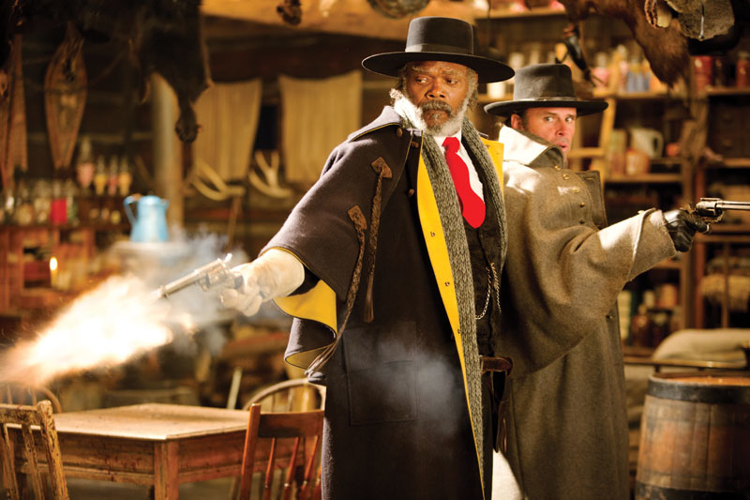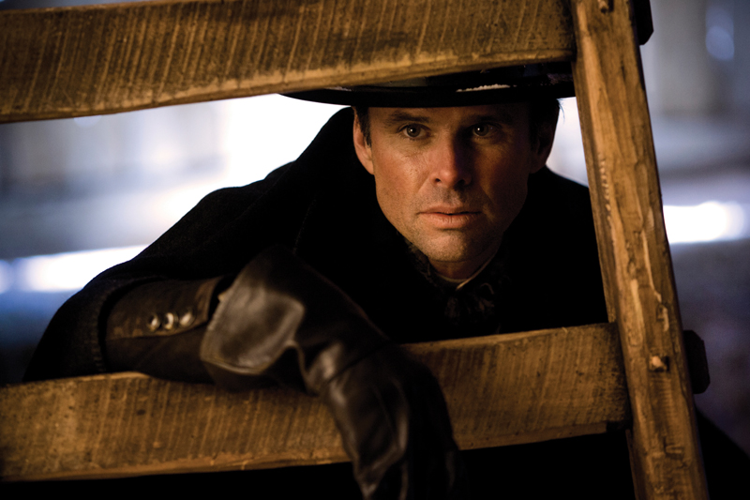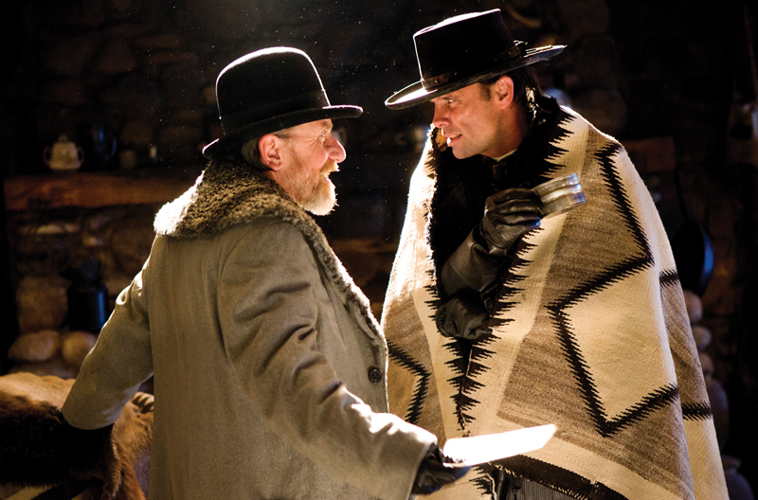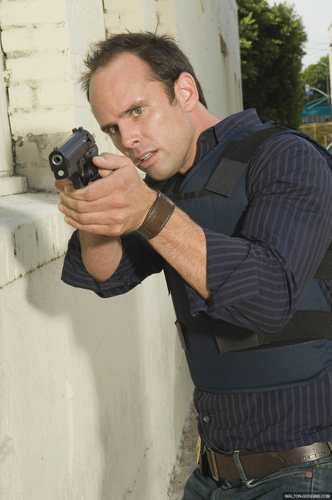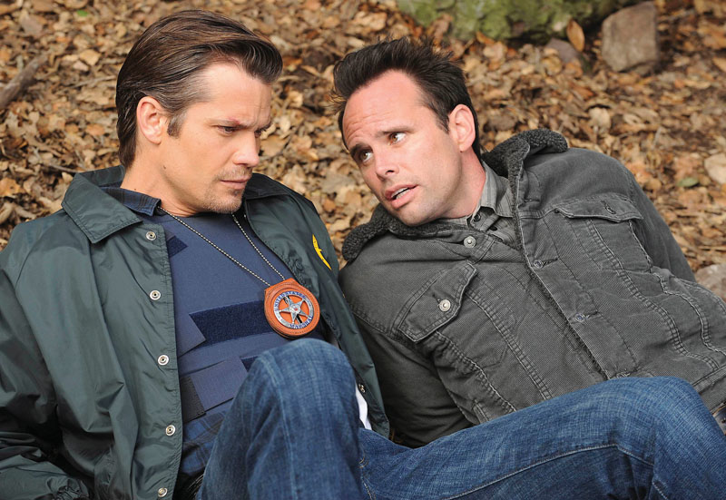You'd think after three hours and 15 minutes in someone's company, you'd recognize them. Then again, when he stepped into an auditorium last week on a surprise visit to Cool Springs' Carmike Thoroughbred 20, Walton Goggins wasn't wearing a head-to-toe outfit of blood and grime.
It took viewers a moment to recognize that the wiry, clean-cut figure down front was the actor they'd just finished watching in The Hateful Eight, the long-awaited "8th film by Quentin Tarantino," which expanded to wide release just last weekend after a weeklong roadshow engagement that opened Christmas Day. And when he showed up in downtown Nashville at year's end for an impromptu press day at the Hermitage Hotel, not even the staff seemed to know (or didn't tip their hand) that he was the soft-spoken gentleman in a pea jacket and broad-brimmed hat sitting inconspicuously on a corner couch.
It's a testament to Goggins' talent that he can still slip through a hotel lobby with little disturbance at a time his visibility's never been higher. A decade ago, he joined the ranks of character actors whose face prompts an immediate, "Hey, it's that guy!" from sharp-eyed viewers, thanks to a meaty high-profile role on Shawn Ryan's underrated FX cop drama The Shield and years of supporting roles in indies such as Robert Duvall's The Apostle and Billy Bob Thornton's Daddy and Them.
By the time The Shield finished its seventh season in 2008, Goggins' Det. Shane Vendrell had evolved from a secondary character — the goofball right-hand man to Michael Chiklis' crooked-cop mastermind Vic Mackey — into the show's tragic center: the only person left in its above-the-law cadre of amoral thugs capable of feeling, and suffering, the weight of his deeds. The character's grimly pathetic exit from the show established one of the actor's specialties: getting audiences to see, however grudgingly, the humanity in otherwise unsympathetic characters.
And yet.
"You know, I was supposed to be fired after the pilot of The Shield," Goggins says, shifting from the back to the edge of the Hermitage's plush couch, flanked by the hotel's oddly incongruous vestiges of Christmas cheer. "The brass at FX saw the pilot, and they thought, 'Who is this fuckin' guy? I don't know — is he irritating? I just, I can't read him.' And Shawn didn't tell me this until we were doing the DVD commentary for Season 1 of The Shield — thank God he didn't tell me.
"But he said to them, 'No, no: This guy is my guy, this guy is very special. And, just, leave it to me.' And he knew — and this is something I didn't know — that Episode 2 of The Shield had to be about Shane Vendrell, and he wrote it as such. And it was after FX saw that that they began to understand what Shawn saw from the very beginning. The rest was played out before the audience."
Most actors luck into one long-running TV role that memorable, and that complex. But Goggins followed it up with an equally indelible character on an equally fine show. As Boyd Crowder, the loquacious Harlan County kingpin who served as foil, mirror image and eventual nemesis to Timothy Olyphant's laconic lawman Raylan Givens on FX's Justified, the Alabama-born, Georgia-raised actor brought shades of class envy, romantic longing and warped courtliness to a part that could have been a violent backwoods cartoon.
When the series ended last year, he was shafted for an Emmy nomination, as he was for his scene-stealing turn as the flamboyant but tender-hearted transgender prostitute Venus Van Dam in former Shield writer Kurt Sutter's Sons of Anarchy. Yet he calls his time on Justified one of the great experiences of his career, "a real collaboration between [show runner] Graham Yost and the writers and Tim Olyphant and myself and the other cast members, because we were all servicing [the characters' creator] Elmore Leonard." His TV roles brought more big-screen work, with Steven Spielberg in Lincoln and with Spike Lee in Miracle at St. Anna, among other films.
The Hateful Eight, however, represents his biggest film role to date, even as it draws upon the qualities that made his TV work so memorable. In Tarantino's chamber Western, Goggins plays Chris Mannix, a stranded stranger who approaches a stagecoach containing rival bounty hunters played by Samuel L. Jackson and Kurt Russell and a leering, bloodied wraith of a prisoner named Daisy Domergue (Jennifer Jason Leigh). With a snowstorm imminent, he talks himself aboard on grounds that he's the new sheriff of the nearby town of Red Rock, due to be sworn in.
Is he or isn't he? The question takes on weight — and suspicion — as the travelers end up snowbound with four others in a haberdashery that represents a vicious parody of the American melting pot. As Mannix, the son of a notorious Confederate raider, commisserates with an unrepentantly bigoted Rebel general (Bruce Dern), they paint the air around Jackson with the most hostile of racial slurs. The movie's harshest detractors have read this as empty race-baiting on Tarantino's part — simple-minded stoking of revenge theatrics, in an escalation of the pustulent burlesque of the writer-director's biggest hit, Django Unchained.
Goggins' character and performance, however, signal that the movie has something else in mind — something more like an exorcism. It's Mannix, the recipient of a lifetime's received opinions about white superiority, who stands to travel farthest, and whose ultimate intentions produce the most suspense. In the bloodbath that follows the intermission, Tarantino suggests that only after venting the full ugliness of suppressed racial hatred — a hatred exploited in the climax by a character who stands to benefit by keeping black and white at each other's throats — can people move toward something like reconciliation, or at least past mutually assured destruction. Of course, by that point in the movie everyone's hands are the same color: red.
For Goggins, the resolution is "a real liberation from ignorance" for a character "who, just, never had an original idea in his life."
"Bigotry by its nature is secondhand," he says, his previously soft, measured tone taking on a tension that reminds you somewhere in this guy are Shane and Boyd Crowder. "Very few people — I'm gonna say, fuckin' no one who is exposed to the world and different cultures from the time they are a baby would come into the world formed as a bigot."
Goggins wasn't involved, he says, in the early controversy that surrounded a leaked version of the Hateful Eight script, which at one point its author threatened to shelve forever in retaliation. But once Tarantino decided to stage a live reading in April 2014 of the first draft in Los Angeles, the actor was among those who got the call.
"I was in Mexico at the time, and it was an extraordinary, and it is an extraordinary thing, to see Quentin Tarantino's name pop up on your phone," Goggins says, flipping up his phone in the Hermitage lobby to demonstrate. "And your immediate response is, 'Yes, I will do that. Yes. Whatever it is you're asking.' " It was his second time working with Tarantino, after his role as a brutal slaver in Django Unchained, but the close quarters and bitter cold of the deliberately frosty set produced a camaraderie unusual for a movie whose characters are defined by their hatred.
Next up for Goggins is Vice Principals, an HBO comedy series from the Eastbound and Down team of Danny McBride and Jody Hill. He'll continue searching for parts guided by the same principle he says he's tried to impart to his almost 5-year-old son: curiosity. When his interviewer suggests that's a hard quality to teach, he draws up.
"No! I disagree," he says. "I think curiosity is part of our nature. I think we are conditioned to suppress curiosity. I think we all start off as curious individuals. Look at a baby! What do they do? A baby is curious about their surrounding — it is that childlike enthusiasm that is so infectious for us as parents." He locks eyes with the interviewer. "That's the way Quentin feels about cinema."
‘Nobody knows the answer, not even my wife’: Excerpts from our interview with The Hateful Eight’s Walton Goggins
Did Quentin Tarantino write the part of Chris Mannix with you in mind?
According to him! I'll say it because the man has said it: That's what he said, and I'll take him at his word. And to say that is a compliment would be the most gross understatement of the year. To be in the head or the imagination of an auteur like Quentin Tarantino is something that an actor doesn't even feel like he has a right to wish for, let alone expect. It's a real honor to be on the other side of this experience, with Quentin and this cast.
What was it like to go from the set of Django Unchained, which was so much bigger in scale, to the relative chamber-room of The Hateful Eight?
It was ... a unique opportunity for the actors involved. We'd all had the opportunity to work with Quentin before — most of us had: Michael [Madsen] and Tim [Roth] had been there from the beginning, and Sam [Jackson] is his muse; he's been there more than anyone else. With the exception of Jennifer [Jason Leigh] and Demian [Bichir], we had all been invited to the party before. And what was so special about this experience is, we were all together all of the time. Whereas in movies Quentin's done in the past, you show up at work and something special happens, and then the next day you would be off for a little bit. But something special is still going to happen — and you missed it. And on this, we were all in it together.
You know, Bruce Dern said something right before we took off to go to Telluride, and Quentin gathered us all in a room — I've never said this in the press before, so this is good — but we're all sitting in this room, and it's as if we're pilots on an aircraft carrier getting our last assignment. We're all in this room together, and we're just kind of talking through it in front of each other — damn, I'll start crying right now, man, because it's so special, and maybe it's because you're almost my last interview that this means so much to me.
There was an opportunity for all of us to be vulnerable in front of each other. And that's what we had throughout this whole experience; those are the conditions Quentin creates. But in this moment — going around all these people, these fucking icons that have history with the man, and seeing them ask their final question or make their final statement publicly, in this public forum of us — it got to Bruce Dern. Bruce said, "I want you to know something, Quentin. Just because I'm 78 years old, and there may be moments that I'm not needed to be in that chair, I want to be in that chair for every frame of this movie. Because I don't want to miss anything."
And we all started tearing up. And once Bruce gave us permission to go there in front of Quentin, Madsen had his thing, and Sam had his thing, and Jennifer had her new thing, and then I got to express my thing, and Kurt [Russell] got to express his thing, and Demian ... and it was just this beautiful last moment before we go to war.
What did you say?
Oh, God. Because I think what other people say is so much more important than my own, I don't remember. But maybe it was something that revolved around, "Thank you, buddy. From the bottom of my heart, thank you."
That set must have demanded a lot of trust. How did you maintain extremes of hostility for so long?
Because it was balanced with this extreme hospitality. And laughter. And closeness. After Quentin called cut, we would all go sit under one of [cinematographer] Bob Richardson's lights because it was so cold in that fuckin' room, and just talk. And listen — to stories that Quentin had, or Dern had, or that Kurt had, or Sam had. And we just talked about the movie — about possible scenarios: "What if you did this, or what would that mean, and when do you give these clues away? What are the clues? And what is really happening — is this a performance within a performance?" And we never exhausted that conversation. We're still talking about it on this press tour. But it would go from that to our lives, you know? And the great ups and downs of one's life, and just living it. And it was beautiful, man.
Was it difficult to constantly weigh how sympathetic or unlikable your character had to be, moment to moment?
Well, yeah. In a piece of material like this — a piece of material like this — you understand the story as a whole. I read a script 250, 300 times, so I want to understand the movement. Especially with Quentin, my first question to him is always, before we do something, "Where do you want the audience to be right now? Where are you in your piece of music? And how can I be of service to that?" And then once you're in the story, and once you understand it, it flows organically. And you don't want to be too rigid, because that's when the ephemeral happens, when the enigma happens. But you also want to fervently protect the story, and the structure that Quentin has created. It's like having all the answers, but none.
Did you go into it thinking you were the sheriff of Red Rock?
(smiles) You know, that's the first question I asked Quentin after reading the script. And he said, "I need for you to make that decision, and I don't want to know your answer." So he is the only person over the course of this experience who has not asked me that question. And nobody knows the answer, not even my wife — except for me.


